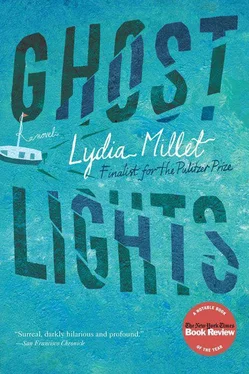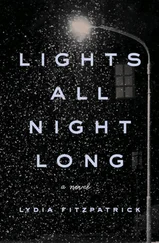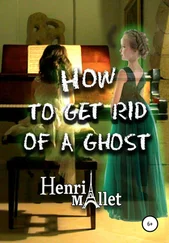Lydia Millet - Ghost Lights
Здесь есть возможность читать онлайн «Lydia Millet - Ghost Lights» весь текст электронной книги совершенно бесплатно (целиком полную версию без сокращений). В некоторых случаях можно слушать аудио, скачать через торрент в формате fb2 и присутствует краткое содержание. Издательство: W. W. Norton & Company, Жанр: Современная проза, на английском языке. Описание произведения, (предисловие) а так же отзывы посетителей доступны на портале библиотеки ЛибКат.
- Название:Ghost Lights
- Автор:
- Издательство:W. W. Norton & Company
- Жанр:
- Год:неизвестен
- ISBN:нет данных
- Рейтинг книги:5 / 5. Голосов: 1
-
Избранное:Добавить в избранное
- Отзывы:
-
Ваша оценка:
- 100
- 1
- 2
- 3
- 4
- 5
Ghost Lights: краткое содержание, описание и аннотация
Предлагаем к чтению аннотацию, описание, краткое содержание или предисловие (зависит от того, что написал сам автор книги «Ghost Lights»). Если вы не нашли необходимую информацию о книге — напишите в комментариях, мы постараемся отыскать её.
How the Dead Dream
Ghost Lights
Ghost Lights
Ghost Lights — читать онлайн бесплатно полную книгу (весь текст) целиком
Ниже представлен текст книги, разбитый по страницам. Система сохранения места последней прочитанной страницы, позволяет с удобством читать онлайн бесплатно книгу «Ghost Lights», без необходимости каждый раз заново искать на чём Вы остановились. Поставьте закладку, и сможете в любой момент перейти на страницу, на которой закончили чтение.
Интервал:
Закладка:
“Excuse the interruption,” he said. “I’m looking for Marlo?”
“He is out working,” said the woman.
“Can you tell me where I can find him, then? It’s about Thomas Stern. His disappearance.”
The woman nodded vaguely. “He’s at the big hotel. The Grove.”
“Oh you’re kidding ,” he said, exasperated. “I just came from there. It’s where I’m staying.”
She nodded again, unsmiling.
“All right,” he said lamely, and turned to go. Then turned back. She was already shutting the door. “Listen, could you tell him I’m looking for him? If we miss each other again? My name is Hal Lindley. Here, here’s my card. Wait, let me write my room number on it. He can stop by whenever. Room 202.” She had to open it wider again for him to stick the card into her fingers. “Thank you.”
After she closed the door on him he stood there for a long moment letting the foreignness absorb him. He had an impression of being out of place: that was what it was, ever since he got here. Even more now, near the village that was in ruins, than at the hotel, of course, since the resort was populated by people he could just as easily have run into on the streets of Westwood.
He looked down at the details of the doorknob — a cheap brassy color — and the frame, which was painted purple. Marlo’s house was not an American house: nowhere in America would you find a house like this. The difference might be in the physicality of the doorframe, the stucco, he couldn’t put a finger on it. Possibly it was more asymmetrical than he was used to, or the lumber was a tree species unknown to him. But somehow there was an irregularity, a foreignness. It seemed to discourage him, imply he was not natural here. He was an intrusion.
Or maybe he had forgotten, over time, how familiar elements everywhere had a steadying influence. At home there was the security of known formulations and structures all over the place, in window fastenings, in the door handles of cars, gas pumps, faucets, sidewalks, restaurants, shoes. Products and habits were so deeply linked it was hard to separate them. And their reliable similarity helped keep him on an even keel, apparently, had given the world a predictable quality that made passage through daily life calm and easy: he glanced around when he was out in the world and he recognized everything. There was almost nothing that jolted him, almost nothing in the landscape that broke him out of his reverie of being.
He had not considered it before, this effect of mass production. Could it be that the very sameness of these commodities, these structures both small and large that gave the physical world its character, afforded a certain freedom from distraction? The ill effects of their sameness, of this standardization and repetition were talked about and studied — how their homogeneity devolved the world and denuded it of forests and native peoples and clean water and difference. But now that he was far from all the standard objects and dimensions what he noticed was how they also gave a feeling of civilization. In their reassurance they conferred strength on the walking man — strength and the illusion of autonomy.
On his way down the garden path he noticed the skull of an animal. It was stuck on a fencepost among flowers — a goat, he guessed from the horns. It still had a little meat on it.
His taxi was nowhere in sight. He stood for a few seconds, waiting, and then started walking back along the troughs of baked road-mud to the village.
• • • • •
He could not find Marlo on the hotel grounds and soon he gave up looking, found a lounge chair beside the pool and ordered a midday beer. He planned to sleep afterward, and was looking forward to it with a kind of greedy anticipation, when the manager of the resort bent over to talk to him. Hal blinked at the blinding light of the sun, saw the man’s broad face recede as he sat up.
There was a small valise of Stern’s clothes, the manager said, which he would have brought up to Hal’s room. Beyond that he feared he could not be helpful; he knew nothing but the name of the town where Stern had rented his boat, and what he had already told Mrs. Stern. It was a very small village at the mouth of the Monkey River, so small it made Seine Bight look like a crowded metropolis. You could only reach the town by water, said the manager, which was why it was so small. There were no roads overland.
The boat itself, said the manager, had come floating back downriver to Monkey River Town during the night. He had told Mrs. Stern all of this. The boat had struck a dock and become wedged underneath, and kids had found it in the morning. They had noticed nothing out of the ordinary. It had been cleaned and tied up but that was all that the manager could tell him. If he wished to learn more Hal could visit the tour guide’s brother, who was not reachable by telephone.
Hal nodded, drained his beer glass and hoped the manager would give up. The double bed was calling, with its bleach-smelling sheets and blessed privacy.
But the manager persevered. “There is a family,” he said. “Other guests. They are from Germany. They are renting a boat to go on a day trip up the river.”
To get to the river Hal would first have to take another, larger boat to the town, he went on. You took one kind of boat to travel down the coast over the ocean, to reach the river delta; then you disembarked and walked to a smaller dock, where you took a different boat to go up the river. Hal could tag along with the Germans if he liked, said the manager, as far as the delta town where the guide’s brother lived. The Germans were taking an afternoon cruise up the river themselves, however; he would have to wait a few hours for the return trip.
So without his rest in the double bed, and slightly disgruntled, Hal met the German family on the dock where they were waiting for the first boat. He shook hands with them and smiled quickly. There were four of them, a mother and father and two young boys, all tall and tanned and lovely, with shining hair in shades of blond and golden-brown and perfectly molded biceps visible where their short, well-ironed cotton shirtsleeves ended. To make matters worse they seemed resolutely cheerful. They radiated something akin to joy. Such Germans were irritating.
On the one hand they were an unpleasant reminder of Vikings and Nazis, on the other hand you envied them.
He, by contrast to the Germans, was a low creature. He was not sleek and limber as a tree, but hunched and preoccupied; he was not shining and tanned, but dim and pale despite the fact that he hailed from Southern California, where movie stars and surfers reigned. He wore a baggy windbreaker and clutched his green-reptile backpack; he was a tired assemblage of imperfect elements. Protruding from his jeans pocket was a wallet messily stuffed with small bills and old receipts.
He watched the Germans file into the powerboat ahead of him, and in particular the two blue-eyed, tow-headed boys, who reminded him of a horror movie he had watched with Casey called Children of the Corn . It struck him that he had been picturing himself in a movie ever since his arrival. It was a movie of his life, which had suddenly become interesting in the way only a story could be, with hills and valleys of plot like a rollercoaster. There was much to laugh at in this posture, certainly, but the feeling of cinematography lingered. He was still half-dazzled by the warm beer.
All of them sat on a bench at the prow, touched by the clean spray as the boat thumped over the waves. No one spoke, though they were all quite close together, perfect strangers, side by side. The Germans, he sensed, felt no awkwardness at this. Probably they were content just to Be.
Though the kids, at least, were now rummaging impatiently in their bags.
Читать дальшеИнтервал:
Закладка:
Похожие книги на «Ghost Lights»
Представляем Вашему вниманию похожие книги на «Ghost Lights» списком для выбора. Мы отобрали схожую по названию и смыслу литературу в надежде предоставить читателям больше вариантов отыскать новые, интересные, ещё непрочитанные произведения.
Обсуждение, отзывы о книге «Ghost Lights» и просто собственные мнения читателей. Оставьте ваши комментарии, напишите, что Вы думаете о произведении, его смысле или главных героях. Укажите что конкретно понравилось, а что нет, и почему Вы так считаете.












